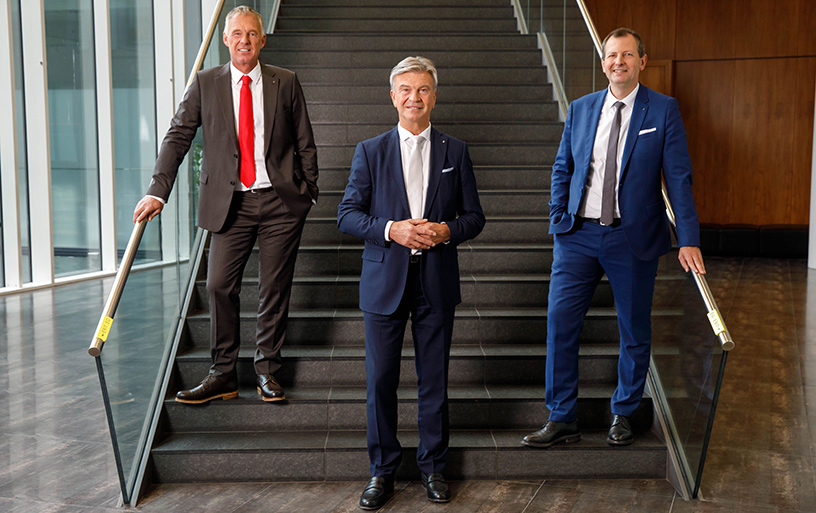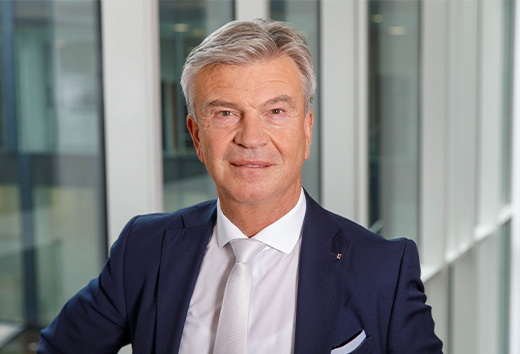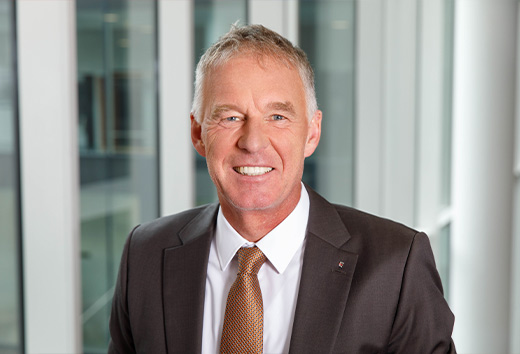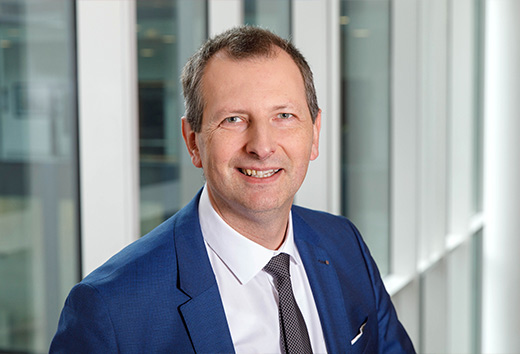
Dr. Andreas Kolar Member of the Management Board
Chief Executive Officer DDr. Werner Steinecker MBA Chairman of the Management Board
Dipl.-Ing. Stefan Stallinger MBA Member of the Management Board
The issue of security of supply has taken centre stage among the general public recently because of the war between Russia and Ukraine. What action has Energie AG Oberösterreich taken to safeguard security of supply in the short, medium and long term?
Werner Steinecker: Ensuring the high supply quality of electricity, gas and heat on an ongoing basis is one of the most fundamental tasks to which Energie AG Oberösterreich is committed. This makes the current situation, in which the fragility of the European energy system has become apparent to us, all the more challenging. Measures including securing gas supplies, filling our storage facilities as much as possible and activating power plants as part of our congestion management strategy meant that we were able to continue supplying energy to our electricity and gas customers without restriction. Sooner or later, though, we will be faced with the only viable option of transforming the energy system as swiftly as possible. We will do everything we can to expand the use of renewable energies, enhance the grid infrastructure at all voltage levels and increase storage capacities.
Ensuring the high supply quality of electricity, gas and heat on an ongoing basis is one of the most fundamental tasks to which Energie AG Oberösterreich is committed. This makes the current situation, in which the fragility of the European energy system has become apparent to us, all the more challenging. Sooner or later, we will be faced with the only viable option of transforming the energy system as swiftly as possible. We will do everything we can to expand the use of renewable energies, enhance the grid infrastructure at all voltage levels and increase storage capacities.
The energy sector is currently experiencing an extremely tumultuous time, including from a financial perspective. What actions have been taken to mitigate the current risks?
Andreas Kolar: The Group has had a standardised and cross-departmental risk management system in place for a while now. Our decision to set up a Risk Committee has enabled us to monitor market conditions and the associated liquidity, counterparty and market price risks even more closely and to use these as a basis to make the necessary corporate decisions at an early stage. Our risk management systems here have played a role in supplying adequate information for business decisions by analysing and aggregating risks, working to mitigate threats in good time and to achieve the desired goals in the best possible way. Following the start of the war in February 2022, a task force was added to this committee to continuously analyse geopolitical developments and to implement measures both of a financial and a legal and technical nature.
The general conditions have been unusually challenging in the year under review and are unlikely to let up in the near future. We will nevertheless continue to pursue our goals of supporting the transformation of energy systems, further optimising the security and quality of supply and thus safeguarding the Group’s development and value in the long term.
Expanding the grid infrastructure is increasingly seen to be absolutely key in efforts to achieve the energy transition. What challenges will this entail?
Stefan Stallinger: The challenges are many – not least because we want to accelerate the work to expand and upgrade electricity grids so as to enable the feed-in of decentrally generated green electricity for everyone. We are, however, in a supplier market, e.g. regarding the availability of transformers or switchgears, due to high demand and low supply. Delivery times are significantly higher than three to five years ago due to material shortages. A key factor for making specific investments in the grid infrastructure is also the creation of regulatory incentives so that expansion is not hampered by financial obstacles (low interest rates). We are also concerned about the project approval procedures, which are at times quite lengthy and result in a lot of time being lost for the work to transform the energy system. We are encouraged, however, by the fact that high-performance electricity grids are increasingly seen by the population as an enabler of the energy transition and as the backbone of security of supply.
We at Energie AG Oberösterreich see ourselves as pacemakers of the energy transition and want to enable everyone to participate in it through a variety of different measures. These range from numerous sales campaigns promoting a switch to heat pumps, customised PV contracting models for private households and companies and our role as an enabler in e-mobility issues to the work to expand district heating networks on an ongoing basis and the highly ambitious expansion path for our own electricity generation plants.
Energie AG Oberösterreich was able to maintain its “A, stable” rating despite the current economic environment. How did it manage this?
Andreas Kolar: The excellent credit rating is partly due to the stable and risk-averse financial policy pursued by the Group in recent years. The rating agency Standard & Poor’s also acknowledges the integrated business model of Energie AG Oberösterreich, which makes it resilient in the face of a crisis. This fact is also reflected in the year under review, in which the weather-related decline in earnings in the Group’s traditional core segment Energy was partially compensated for by higher earnings contributions in the Grid and Waste Management Segments. This excellent rating once again underscores the Group’s impressive ability to perform – a prerequisite that has empowered Energie AG Oberösterreich to reliably meet the challenges posed by volatile and sharply rising energy prices and, not least, the economic impact of Russia’s war with Ukraine during the reporting period. Transforming the energy system in such a way as to make it climate neutral will require vast amounts of financial resources. Having the top rating “A, stable” confirmed enables us to face the demands of the future and to implement clear investment and financing targets.
Energie AG Oberösterreich was named “Austria’s Best Employer” by the renowned Trend magazine. What were the primary reasons for this?
Werner Steinecker: The award is a perfect way of achieving recognition for the large number of measures that have been implemented in recent years to foster an employee-friendly working environment. We are particularly proud of our ongoing work to improve our employees’ work-life balance, such as establishing a childcare facility at the head office of Energie AG Oberösterreich in summer 2022. We also attach great importance to the numerous models in place to support the continuous professional development of our employees. Expanding our trainee, training and mentoring programmes is a way for us to help ensure that colleagues are given room for development and personal growth. We are also pleased that the representative study saw us as a modern employer that focuses on key jobs of the future such as the energy transition, the circular economy and expanding broadband networks. The award is all the more valuable in such times where there is a shortage of skilled workers.
The Austrian government aims to generate almost 45% more green electricity than before by 2030. How can this Herculean task be achieved and what role will Energie AG Oberösterreich play here?
Stefan Stallinger: The Austrian government’s climate and energy targets are undoubtedly ambitious, driven by the momentum of the crisis, but we are also noticing a sharp rise in levels of commitment from industry, politics and the population to forge ahead with efforts to transform the energy system. Both to reduce dependence on global energy imports and to optimise our own carbon footprint for the sake of climate change mitigation and sustainability. We at Energie AG Oberösterreich see ourselves as pacemakers of the energy transition and want to enable everyone to participate in it through a variety of different measures. These range from numerous sales campaigns promoting a switch to heat pumps, customised PV contracting models for private households and companies and our role as an enabler in e-mobility issues to the work to expand district heating networks on an ongoing basis and the highly ambitious expansion path for our own electricity generation plants. The aim is to produce regionally sourced green electricity for an additional 180,000 households through the construction of hydropower plants, wind farms and PV installations by 2030. These measures alone will enable us to save over 550,000 tonnes of CO2 and cut energy imports by as much as 500 GWh.
Rising energy prices have become a major burden for an ever-growing proportion of the population in 2022. How has Energie AG Oberösterreich dealt with this situation?
Werner Steinecker: Fortunately, we have been able to maintain the price guarantee for electricity and gas that was announced in October 2021 until 1 January 2023, a fact made possible by having a forward-looking energy procurement policy focused on minimising risk. Legislative relief such as the abolition of the flat rate for green electricity and the green energy subsidy, and energy cost compensation being granted means that existing customers of Energie AG Oberösterreich paid less for their electricity in 2022 than in the previous year while their consumption remained unchanged. We are pleased that we were able to demonstrate to our customers that we are a reliable partner even in such challenging times.
What challenges will this spell for the 2022/2023 fiscal year?
Andreas Kolar: We have been in a kind of permanent crisis for nearly three years now, one which has recently intensified in terms of the diversity and complexity of the problems we face. One of these problems is the general economic outlook, which is characterised by persistently high rates of inflation and low growth forecasts. Despite these general conditions, there are plans to invest more than EUR 250 million in a sustainable energy future in the 2022/2023 fiscal year, which will make a key contribution to regional value creation. The availability of material and human resources will be crucial in efforts to realise these plans, as will the length of the procedure for approving relevant projects. The aim is to support the transformation of energy systems, to further optimise the security and quality of supply and thus to safeguard the Group’s development and value in the long term. We are confident of our ability to continue successfully mastering such challenges in the future.
The share of fossil fuels used to supply heat remains very high, and with it the level of global dependency. How can this be countered?
Stefan Stallinger: The recently completed district heating project for the city of Wels is a very good example of how this objective can be achieved. The second largest city in Upper Austria has been supplied exclusively with sustainable energy since May by harnessing the industrial waste heat coming from our waste incineration plant WAV. The sector coupling solution also means that the population of Wels is not affected by any gas supply shortages or by the extreme gas price volatility. Not only is sector coupling essential through the use of industrial waste heat, but also through the future production of green hydrogen from renewably sourced electricity. Energie AG Oberösterreich is involved in various hydrogen research projects in order to contribute to making the climate-neutral and storable energy carrier an essential part of the energy and heat transition. The basis for this is the ambitious work to increase renewable electricity generation activities.




